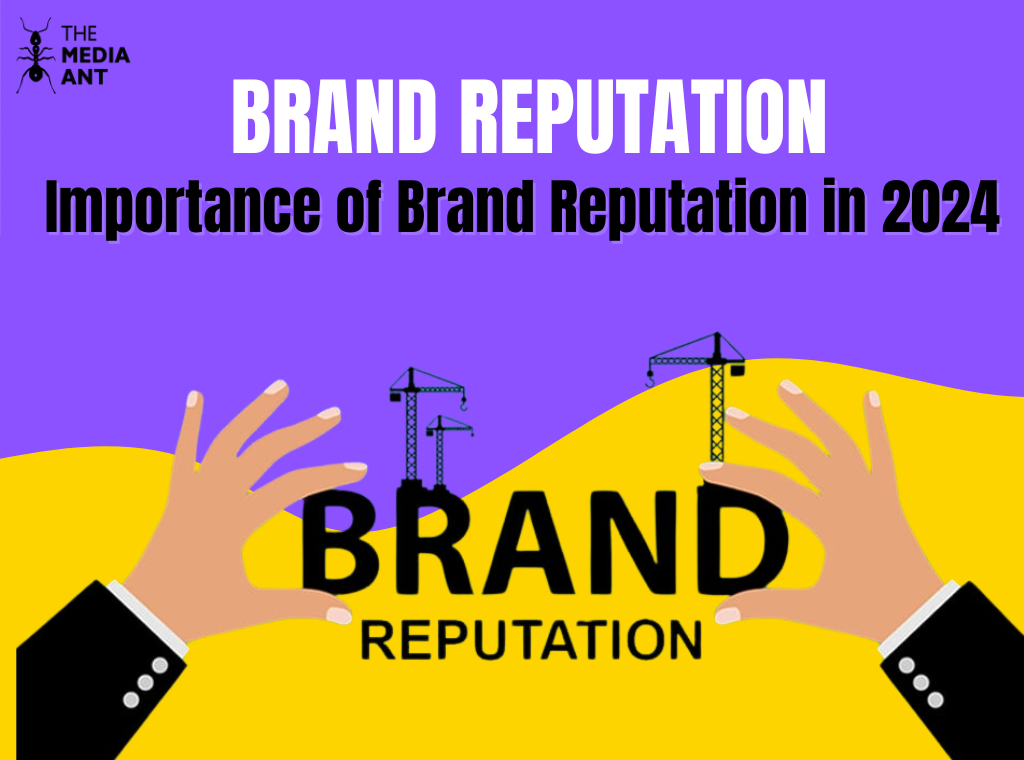In a market evolving at a rapid pace, daily trends continually update, emphasizing the crucial importance of brand reputation. As a business transitions into a brand, numerous new elements must be incorporated. Among these, marketing and advertising stand as foundational pillars, highlighting the paramount significance of reputation.
A brand’s message creation and subsequent awareness-building efforts are pivotal. Through this messaging, reputation is cultivated, shaping an image for consumers to connect with directly. The brand’s image becomes a conduit for consumer connection, with the logo serving as a readily resonant symbol. Thus, brand reputation is intricately woven through these fundamental aspects.
What does brand reputation signify or mean?
Brand Reputation encapsulates the collective perceptions,sentiments of the consumers as they relate to the brand through these points. It encompasses a myriad of factors, including product quality, customer service, corporate values, and social responsibility initiatives. Essentially, brand reputation serves as a barometer of trustworthiness, reflecting the extent to which consumers perceive a brand as credible, reliable, and aligned with their values and expectations.
Importance of Brand Reputation- Why does it matter?
In this digital era, where connectivity and reach pose no barriers, brands must remain vigilant and attentive to their operations. They need to stay on their toes for various reasons, ensuring that all branding efforts across social media platforms and advertising channels effectively convey the brand message. Consistency is key across all marketing mediums because any deviation in communication can significantly impact brand reputation, particularly in a landscape where consumers exhibit a high level of skepticism. Should the messaging shift and fail to resonate with consumers, it can swiftly alter the brand’s reputation. Therefore, maintaining a unified and coherent brand message is paramount for sustaining consumer trust and loyalty.
How to measure brand reputation in terms of marketing?
1. Brand Awareness Metrics
Brand Awareness metrics is a key tool to measure brand building ideology. These metrics provide valuable insights into the extent to which consumers are aware of a brand, its products, and its values. By tracking brand awareness metrics, businesses can assess their brand’s visibility, reach, and impact in the market.
2. Engagement Metrics
One of the most important metrics is analyzing engagement as a brand always has to keep its consumers engaged. One brand stands out with their engaging campaigns to measure and analyze to keep improving on the content part. Brand reputation builds its essence when Engagement metrics are always high. Once a consumer is satisfied with the content which they see one can understand that brand awareness is built hence automatically brand reputation parallely grows. Some key engagement metrics in brand reputation:
- Social Media Engagement
- Engagement Rate
- CTR(Click through rate)
- Time Spent on page
- Customer feedback and reviews
- Brand Mentions and Sentiment Analysis
- Email Open rate and CTR
- Event Attendance and Participation
- Share of Voice
- Net Promoter Score (NPS)
3. Brand Sentiment Analysis
Brand sentiment analysis is a valuable tool used by businesses to understand how consumers feel about their brand. It involves analyzing online mentions, comments, reviews, and other forms of user-generated content to gauge the overall sentiment towards the brand. By conducting brand sentiment analysis, businesses can gain insights into consumer perceptions, identify potential issues or concerns, and measure the effectiveness of their brand-building efforts.
4. Brand Perception Surveys
These surveys are extensively used to measure the insights of the brands awareness, engagement and metrics of the social media contents along with other Ad engagements. Adding to that, these surveys gather insights into various aspects of the brand, including its image, reputation, values, and positioning in the market. By conducting brand perception surveys, businesses can identify strengths, weaknesses, opportunities, and threats related to their brand reputation.
5. Customer Acquisition and Retention
Brand reputation is directly related to customer acquisition and retention, as a positive brand image in front of customers immediately signals customer loyalty. A brand utilizes its content to acquire more and more customers, and building a strong brand reputation is definitely a key metric to achieve this. Customers in today’s market are very fickle-minded, given the plethora of options available to them. This factor prompts brands to focus on building a positive reputation, hence brand reputation management comes into play. This aspect has a significant impact on brand image and customer acquisition.
6. Competitive Analysis
A brand is always looking for scope to improve and majorly better than their competitors. Competitive analysis is a key aspect into a brands reputation game. One of the major things is competitive analysis. By conducting a thorough competitive analysis, businesses can identify strengths, weaknesses, opportunities, and threats in their market landscape, allowing them to refine their brand positioning, messaging, and strategies accordingly.
7. Brand Equity Metrics
Brand equity metrics are essential for assessing the value and strength of a brand within the marketplace. These metrics provide insights into how consumers perceive and interact with a brand, influencing their purchasing decisions and loyalty. By measuring brand equity metrics, businesses can evaluate the effectiveness of their brand-building efforts and identify areas for improvement.
8. Marketing ROI
Marketing ROI (Return on Investment) plays a crucial role in assessing the effectiveness and impact of marketing efforts on brand reputation. It measures the financial return generated from marketing investments relative to the cost of those investments. While ROI is often associated with tangible metrics such as sales revenue and profit, it also encompasses intangible factors such as brand equity, awareness, and perception.

Case Studies of Successful Brand Reputation Management

1. Brand: Cred
Category
Financial Services
Campaign Objective
To maximize the payment experience for credit card users by issuing benefits, creating a trusted and private community for whom economic circumstances are at their very best.
Approach & Targeting
The market segment focused on affluent and smart customers with credit scores of and above 750. Ads were aimed at urban, Generation Y community 35+. The viral marketing, celebrities endorsements, and partnership with premium brands took major part in identifying, attracting and keeping this narrow audience
Impact
Brilliantly distinguished business from the competitors out in the fintech market scene where customers felt confident and loyal to the company. Owing to such entities in the marketing space, along with the referral and rewards system, the company has seen great user join the platform and activity, this has boosted its brand to class its services as premium.
Source
https://unboxingstartups.com/cred-case-study-the-successful-story-of-a-fintech-startup/

2. Brand: Paytm
Category
Digital payments and financial services
Campaign Objective
In order to get people to do more digital transactions and with Paytm as the main choice when paying, buying air time, or banking and more, we should strive.
Approach & Targeting
Attempted to tap into a wide client base comprising urban and rural areas through the push for digital transactions among poorly served customers as they move from cash to digital payments regime. As one of the last stages of the brand launch, applied diverse marketing techniques such as joint branding, celebrity endorsement, event sponsorship, and digital marketing campaign to maximize brand recognition and number of users.
Impact
Paytm became the dominant player in the field of digital payments in India and with the intake of the users and transaction volume experienced a significant growth. By the Indian cricket team sponsorship, the brand visibility reached skyrocket levels and a wide mass of consumers got acquainted with the brand and thus built confidence and trust for it.
Source
https://startuptalky.com/paytm-case-study/

Faqs on Brand Reputation
1. What factors influence brand reputation?
Several factors influence brand reputation, shaping how consumers perceive and interact with a brand. These factors can be from internal and external to the organization. Lets see what can be the points
- Product Quality
- Customer Service
- Brand Messaging
- Corporate Social Responsibility
- Brand Consistency
- Brand Trustworthiness
- Brand Associations
- Online Reputation
- Employee Behaviour
- Crisis Management
2. What is the impact of brand reputation?
- What is the impact of brand reputation on consumer purchasing decisions?
Brand reputation plays a significant role in influencing consumer purchasing decisions. A positive brand reputation can increase consumer trust, confidence, and loyalty, leading to higher purchase intent and preference for the brand’s products or services.
- How does brand reputation effect customer loyalty and retention?
A strong brand reputation fosters customer loyalty and retention by building trust, credibility, and emotional connection with consumers. Satisfied customers are more likely to remain loyal to the brand, make repeat purchases, and advocate for the brand among their networks.
- What is the impact of brand reputation on brand equity and value?
Brand reputation directly impacts brand equity and value by influencing consumer perceptions, brand preference, and market position. A positive brand reputation enhances brand equity, driving increased brand value, market share, and financial performance.
- How does brand reputation influence consumer advocacy and evangelism?
Brand reputation inspires consumer advocacy and brand evangelism by fostering positive word-of-mouth, referrals, and r
3. What is the relationship between brand and reputation?
- What is the difference between brand and reputation?
A brand is a set of perceptions, associations, and experiences that consumers have with a particular product, service, or company. It encompasses elements such as brand identity, positioning, and messaging.
- How are brand and reputation related ?
Brand and reputation are closely interconnected, with brand contributing to reputation and vice versa. A strong brand with positive associations, consistent messaging, and exceptional customer experiences tends to build a positive reputation over time.
- How does brand influence reputation?
Brand influences reputation by shaping how consumers perceive and interact with the brand. A well-defined brand identity, differentiated positioning, and effective brand communication strategies can positively influence consumer perceptions and contribute to a favorable reputation.
- What role reputation plays in shaping brand perception?
Reputation plays a significant role in shaping brand perception by influencing consumer attitudes, beliefs, and behaviors towards the brand. A positive reputation enhances brand trust, credibility, and perceived value, leading to increased brand preference, loyalty, and advocacy.
- How do brand and reputation contribute to brand equity?
Brand and reputation both contribute to brand equity, which represents the overall value and strength of a brand in the marketplace. A strong brand with a positive reputation enhances brand equity by building customer trust, loyalty, and preference.
How do ethical considerations impact brand reputation?
- Why are ethical considerations important for brand reputation?
Ethical considerations are important for brand reputation because they reflect the values, principles, and integrity of a brand. Brands that prioritize ethical behavior demonstrate a commitment to doing what is right, which builds trust, credibility, and loyalty among consumers, stakeholders, and the public.
- What are some examples of ethical considerations that can impact brand reputation?
Examples of ethical considerations include fair labor practices, environmental sustainability, responsible sourcing, diversity and inclusion, product safety and quality, transparent business practices, and philanthropic initiatives.
- How can unethical behavior damage a brand’s reputation?
Unethical behavior, such as dishonesty, exploitation, environmental harm, or discrimination, can significantly damage a brand’s reputation. Consumers are increasingly conscious of ethical issues and are quick to criticize and boycott brands that engage in unethical practices.
What are the consequences of a damaged brand reputation?
- What are the consequences of a damaged brand reputation?
The consequences of a damaged brand reputation can be severe and far-reaching. They may include loss of customer trust and loyalty, decreased sales and revenue, negative impact on market share and competitiveness, erosion of brand equity and value, increased customer churn and acquisition costs, and damage to relationships with stakeholders and partners.
- How does a damaged brand reputation affect consumer trust and loyalty?
A damaged brand reputation can lead to a loss of consumer trust and loyalty. Consumers may become wary of engaging with the brand, switching to competitors they perceive as more trustworthy. Negative perceptions and experiences can erode the emotional connection and loyalty that consumers feel toward the brand, leading to decreased repeat purchases and advocacy.
- What are the financial implications of a damaged brand reputation?
The financial implications of a damaged brand reputation can be significant. Decreased sales and revenue, coupled with increased marketing and promotional efforts to repair the reputation, can lead to reduced profitability and financial losses. Moreover, the costs associated with crisis management, legal fees, and reputation repair efforts can further strain the brand’s finances.
Brand reputation plays a vital role in raising customer awareness about a brand, necessitating frequent optimization due to intense competition. Customers exhibit loyalty to their brand when pricing factors and various other elements are effectively combined. In 2025, where trends change daily, brands must align their content with prevailing trends as customers primarily engage with trends through their social media presence. Therefore, brand reputation must continuously evolve while maintaining a consistent message. In the relentless pursuit of excellence, brands must remain vigilant, adaptive, and unwavering in their commitment to upholding their reputation as a beacon of trust, integrity, and excellence.





